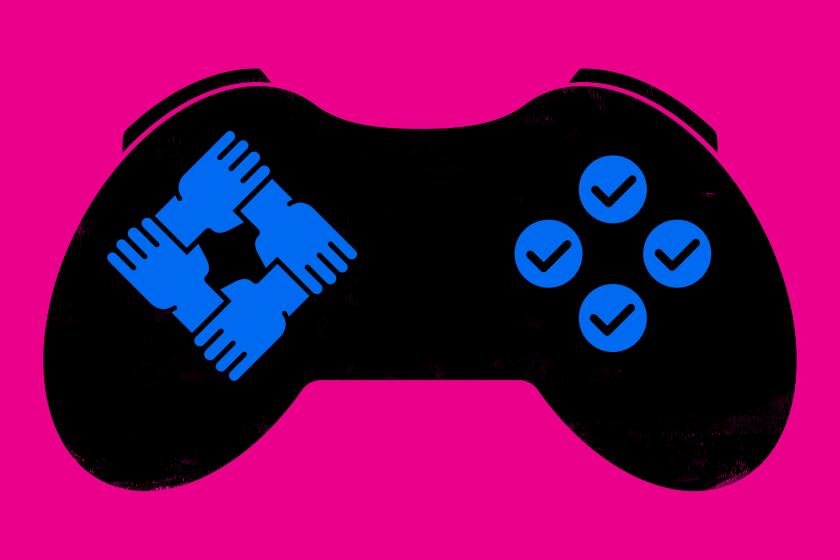The video game industry boomed during the pandemic. Now thousands are being laid off

- Share via
Ryan Lastimosa was home recovering from surgery when he received a text message from his boss at Respawn Entertainment saying that they needed to talk.
After nearly a year and a half of developing a single-player game for the Chatsworth-based studio, Lastimosa was informed in March that the company was scrapping the game. His team of 47 workers faced losing their jobs.
“It wasn’t a surprise to me that the project was canceled. The writing was somewhat on the wall,” said Lastimosa, a creative director who had worked for Respawn since its founding 13 years earlier. “I had to get my mind in the right state to start addressing things that were a priority aside from game development. I had to make sure that my team was taken care of.”
Amid complaints about crunch times, claims of discrimination and calls for fair and transparent pay, more video game workers are seeking to unionize.
Lastimosa started to look for other places within Respawn — and parent company Electronic Arts — that his team could move to in order to avoid layoffs.
At the same time, Redwood City-based EA had announced in March that it was cutting 6% of its headcount, about 800 jobs, and reducing its office space amid restructuring to focus on “strategic priorities.”
A spokesperson for EA declined to comment.
The game industry has corrected its course over the last year following breakneck growth, experts say, as publishers and developers adjust to post-pandemic demands, rising production costs and growing competition in the industry.
The result: Roughly 6,500 video game workers have been laid off globally since January, including hundreds at California-based companies, according to industry estimates. Some analysts believe the figure could be much higher because several companies have not disclosed the number of jobs they cut.
The layoffs have affected game and tech companies such as San Francisco-based Unity, Amazon’s games division and Riot Games in Los Angeles, among others.
Although the cuts represent a small portion of the total industry workforce, many see the last year of downsizing as particularly brutal for workers in an otherwise banner year for games.
“We’re seeing the wave of companies who, essentially, either they over-expanded or they hired based on certain expectations,” said Kevin Klowden, chief global strategist at the Milken Institute. “And every time that there’s a major merger of any kind or anything like that, it has a very real demonstrable impact on employment.”
This month, Amsterdam-based data firm Newzoo lowered its global game revenue forecast for 2023 to $184 billion, up 0.6% from the previous year but down from the $187.7 billion the company initially predicted for 2023.
The global games market is expected to generate yearly revenues of $205.7 billion in 2026, Newzoo said.
The cost-cutting has a ripple effect in California, which is home to 720 video game companies, nearly 700 of them game publishers, game developers or software developers, according to the Entertainment Software Assn. trade group. Several major publishers are based in Southern California, including Activision, Blizzard Entertainment and Riot Games, as well as the North American headquarters for Sega of America.
As of 2022, the most recent year for which data is available, the industry employed more than 152,000 people in the state, with $54.1 billion in total economic impact.
“In the U.S. alone, the video game industry has more than tripled in size in the last decade, growing from $15.2 billion in 2012 to $56.6 billion in 2022,” said Aubrey Quinn, senior vice president of the Entertainment Software Assn. “No other entertainment industry experienced that level of growth.”
Despite job cuts, she said, video games remain a growth industry.
“These are high-paying jobs — more than double the national average salary,” she said. “More than 212 million Americans play video games regularly, so the demand for beautiful, compelling games isn’t going anywhere.”
SAG-AFTRA members will vote this month on whether to authorize union leaders to call a strike against video game companies. Here’s how we got to this point.
In Lastimosa’s case, he was able to work with management to find work for many of the people on his team. One married couple was in danger of being laid off, he said, but he and management found a place for one person so both wouldn’t be unemployed. Lastimosa opted for a severance package and decided to leave the company.
“I was burned out and tired,” he said. “I realized that I just needed a break.”
To him, the outsize growth the industry saw during the pandemic is part of the reason for the cuts this year.
“We had a lot of investors and a lot of different types of funds invested heavily in game development once they saw that massive uptick in people playing games and staying home and buying lots and lots and lots of stuff digitally,” said Lastimosa. “And now they’re seeing that curve has dropped.”
In response to industry turbulence, Amir Satvat, who lives in Connecticut, launched a package of seven online games job resources that includes a job directory and a place for people to sign up to connect with mentors.
Satvat, a “top voice in video games” on LinkedIn, provides the service for free — as do the mentors volunteering their time. Nearly 9,000 people have signed up for his “Job Seeker’s Workbook” and more than 900 people have volunteered to be mentors and reviewers.
About 350,000 people work in gaming globally, said Satvat — the estimated 6,500 layoffs represent only about 2% of the industry. But the cuts are “still very troubling” even if they are a small percentage.
Microsoft’s purchase of ‘Call of Duty’ maker Activision Blizzard marks the biggest deal in video game industry history.
Several factors are contributing to layoffs, said Satvat. In addition to post-pandemic turbulence and the reality of cuts after acquisitions, layoffs also are the result of an influx of companies trying to break into live service games and greater competition for gamers’ limited screen time.
“Games are now longer than ever. They’re, in many cases, these 100-hour-plus epics,” said Satvat. “There are so many competing forms of entertainment, from streaming video to music to social platforms, that the average person only has so many hours in the day to dedicate to entertainment. And so it’s hard for all these titles to find a market.”
The increased cost of development means there’s more of a boom-bust cycle than before, he added, with greater pressure on every game release “for people to make it, and if they don’t, there’s consequences.”
Evan Tappero worked in Northern California in EA’s mobile games division on the interior decorating game “Design Home” before he was laid off in April. EA acquired the company that developed “Design Home,” Glu Mobile, for $2.1 billion in 2021.
Tappero’s primary role was running live operations for the game after working on it for six years, he said.
The 38-year-old was on paternity leave when the company announced it was making cuts. It wasn’t until he returned a few weeks later that he learned he would also be let go.
The news hit him hard as a new parent.
“The primary explanation was just due to changes in the market and the game industry as a whole, sort of rebounding from high times during COVID and seeing this lapse after that,” said Tappero, who lives in the Bay Area.
Although he was surprised, he said the potential for layoffs is always on game workers’ minds.
After six months of searching, nearly 100 applications and 10 interviews, Tappero is still looking for a new job.
“There’s a lot of competition,” he said. “You just kind of have to swallow it and keep going.”
More to Read
Inside the business of entertainment
The Wide Shot brings you news, analysis and insights on everything from streaming wars to production — and what it all means for the future.
You may occasionally receive promotional content from the Los Angeles Times.














